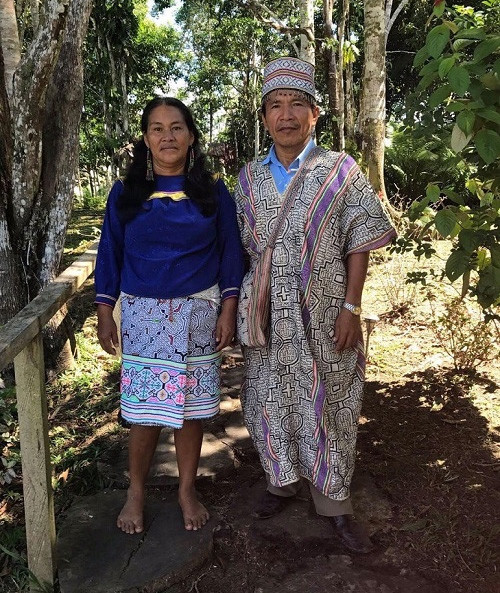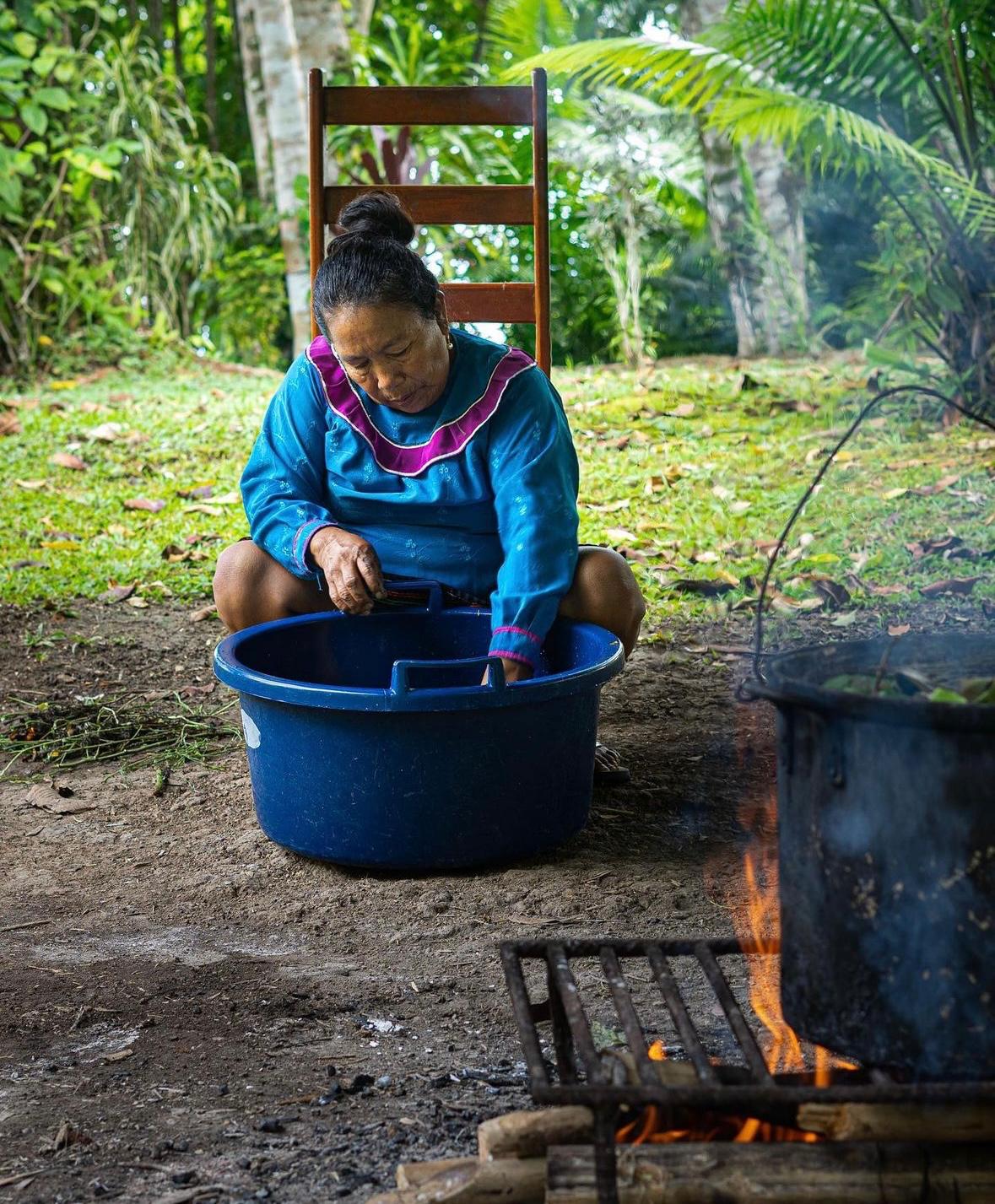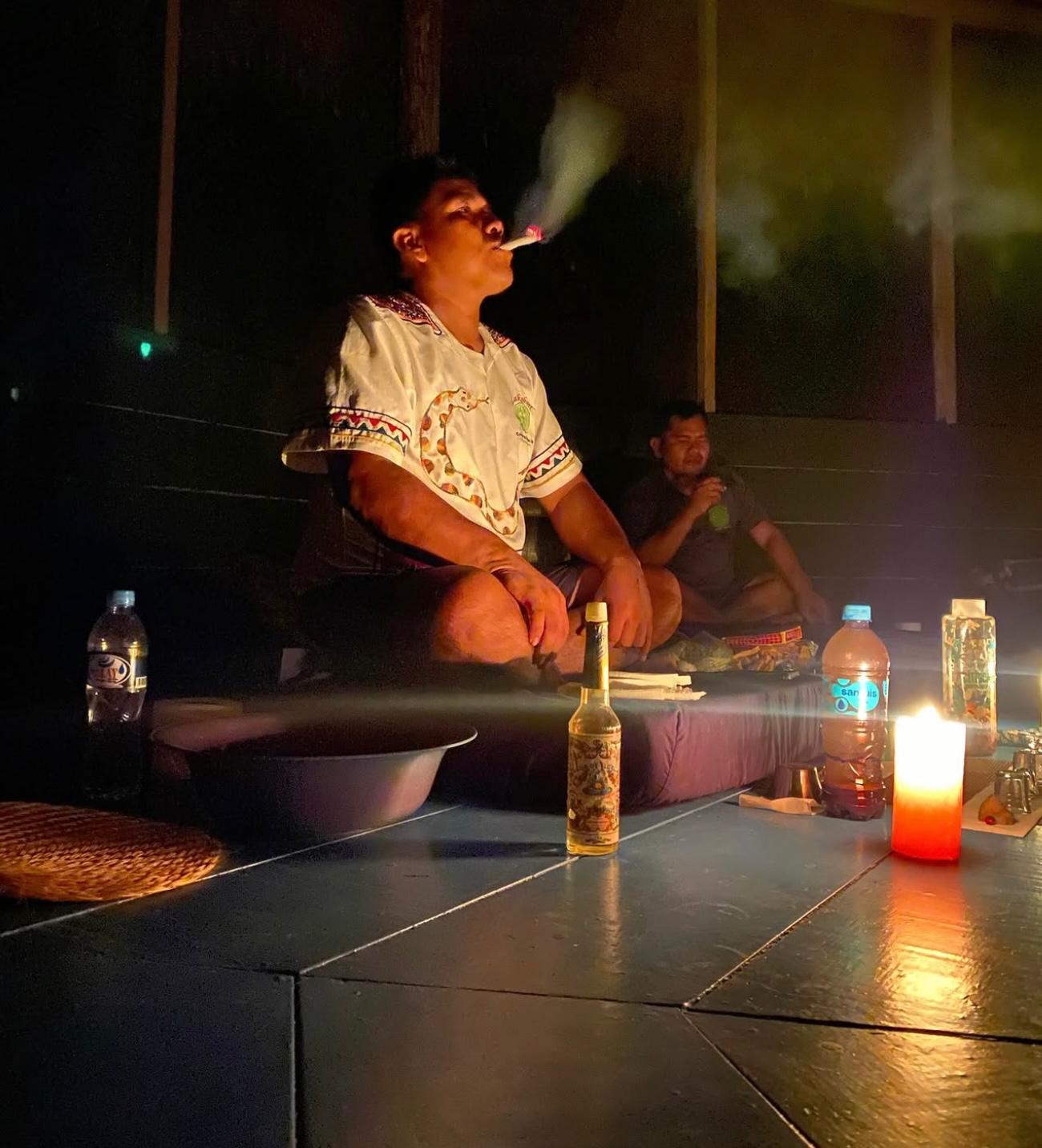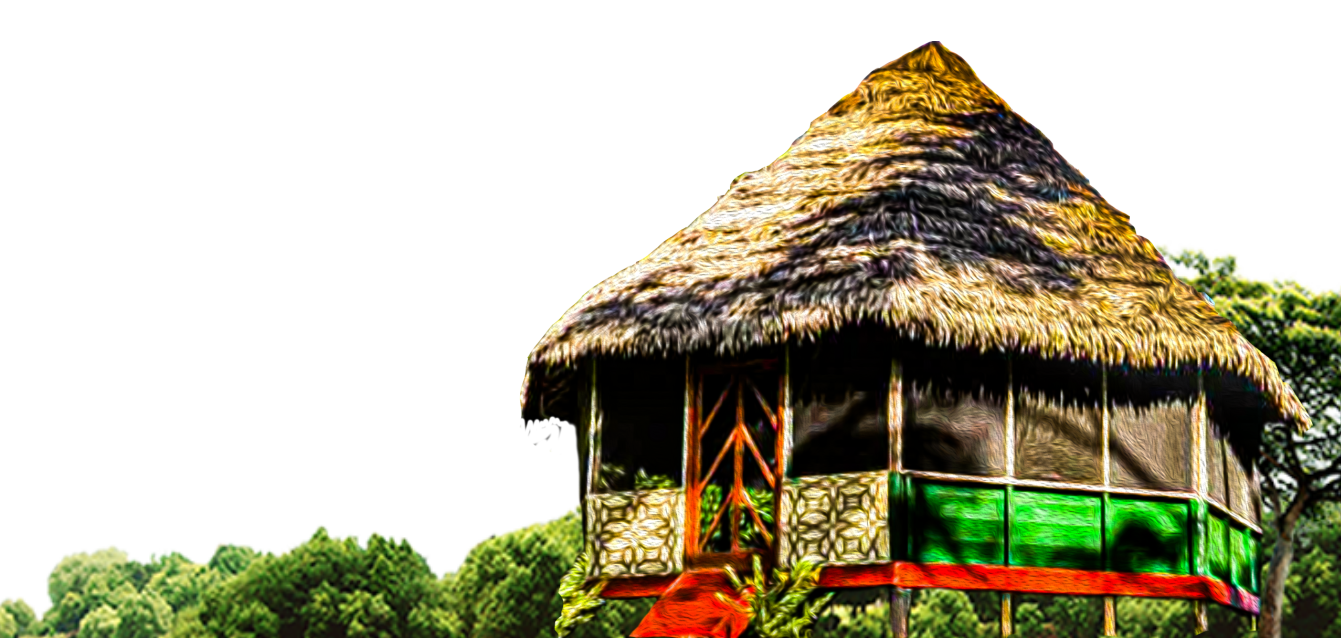SHIPIBO TRADITION IN PERU
A Profound Connection with the Amazon
The Shipibo are an indigenous people residing in the lush and vibrant Amazon rainforest of Peru, where the jungle serves not only as their home but also as a profound source of wisdom and spirituality. Their culture is rich and diverse, encompassing traditional practices, art, music, and healing rituals, all intricately woven together by a deep-seated connection to nature and the spiritual realm.
A hallmark of Shipibo culture is their extensive knowledge of plant medicine, cultivated through centuries of respectful and harmonious interaction with the rainforest’s flora. Among these practices, ayahuasca stands out as a pivotal element. This psychoactive brew, derived from the Banisteriopsis caapi vine and other plants, is revered for its ability to facilitate healing and spiritual insight. The Shipibo are believed to have been the original discoverers of this potent plant thousands of years ago, considering it a sacred gift that provides clarity and transformation to those who seek it.
Ayahuasca ceremonies in Peru are led by Shipibo shamans, regarded as mediators between the physical and spiritual worlds. These “masters of medicine” possess profound knowledge of the plants and their properties, as well as the rituals that help participants connect with the spiritual dimension. Through the chanting of icaros—sacred songs sung during the ceremonies—shamans invoke the energies of nature and the spirits, creating a sacred space conducive to healing and personal transformation.
In this context, the Flower of Life Ayahuasca Healing Center emerges as a sanctuary where the rich traditions of the Shipibo blend with contemporary healing practices. This center provides a safe, respectful environment for individuals seeking the transformative experience of ayahuasca, guided by seasoned shamans who honor and preserve the age-old wisdom of their ancestors.
Beyond ayahuasca, the Shipibo engage in various other healing rituals, such as plant baths and dietas—regimens of dietary and spiritual restriction designed to purify the body and soul. These practices are vital for spiritual growth and foster a deep connection to the natural world, enabling participants to open themselves to new experiences and insights.
The artistry of the Shipibo is equally significant, characterized by intricate geometric patterns and sacred symbols that embody their visions and beliefs. Shipibo textiles, ceramics, and crafts are not merely aesthetic; each design is imbued with profound meaning and reflects the spirituality of their culture. These artistic expressions are inspired by the visions encountered during ayahuasca ceremonies, transforming spiritual experiences into tangible works of art.
The traditions of the Shipibo represent a rich legacy of ancestral wisdom that remains relevant in today’s world. In an era when the connection to nature is increasingly tenuous, the Shipibo worldview encourages us to reflect on our place in the universe and the importance of living in harmony with our environment. Through their practices, teachings, and artistic expressions, the Shipibo offer a glimpse into a way of life that values healing, spirituality, and the interconnection of all beings.
In summary, the traditions of the Shipibo serve as a powerful reminder of the richness of indigenous culture in the Amazon, acting as a beacon of knowledge and spirituality that continues to illuminate paths for future generations. In this journey toward healing and understanding, the Flower of Life Ayahuasca Healing Center stands as a bridge connecting ancient wisdom with the needs of the modern world.
Vomitivos
Upon awakening on the first morning at Flower of Life Ayahuasca Healing Retreat Center in Peru participants engage in a traditional Shipibo practice known as a vomitivo. This cleansing ritual, prepared with medicinal plants, is used by the Shipibo people to purify the body, stomach, and intestinal tract before embarking on Ayahuasca ceremonies. The vomitivos are exclusively crafted with Herba Luisa (lemongrass) and involve drinking a bowl of lemongrass water followed by several bowls of warm water until the body naturally expels the contents. While the process may not sound appealing, most individuals report feeling rejuvenated and mentally clear afterward. This ritual offers benefits by helping the body eliminate potentially harmful substances or aiding in the removal of food in case of intestinal blockages.
Flower Baths
Each guest at Flower of Life Ayahuasca Healing Retreat Center in Peru will partake in a floral bath, a sacred tradition rooted in the use of medicinal plants, flowers, and positive intentions. These baths are designed to elevate the aura field, infusing it with the natural vitality of flowers and imbuing it with positive energy. The practice is believed to bring good fortune, dispel negative energies, enhance focus and concentration, increase feelings of positivity and happiness, foster a sense of calmness, and deepen spiritual connections. To maximize the benefits of the floral bath, it is recommended to air dry after the ritual and wait several hours before showering or bathing.
Cleansing with Tobacco
For centuries, Shipibo Shamans have incorporated the use of tobacco, known as mapacho, in their rituals and sacred ceremonies as a means of forging connections with the Creator, Mother Earth, the spirits of plants and animals, and the soul. Tobacco holds a revered status as the most sacred of all indigenous medicinal plants and is an essential component of Ayahuasca and San Pedro ceremonies, facilitating communion with the divine.
In Shipibo tradition tobacco is regarded as a powerful tool for opening channels of communication, honoring elders, and seeking wisdom through shared knowledge and prayers. During ceremonies at Flower of Life Ayahuasca Healing Retreat Center in Peru the Maestro Shaman ceremoniously blows the smoke of mapacho using a sacred pipe over each participant’s crown chakra, hands, and around the body, aiming to heal and fortify the aura field.
This act symbolizes the element of air in shamanic practices, embodying purification, protection, and the invocation of spiritual energies. Through the ritualistic use of tobacco, participants are guided towards a deeper connection with the spiritual realm and a harmonious alignment with the forces of nature.
Vapor Bath with Medicinal Plants
The therapeutic practice of vapor baths with medicinal plants offers a holistic approach to promoting wellness and balance within the body. By harnessing the healing properties of botanicals in steam baths or saunas, individuals can experience a serene and rejuvenating therapy.
Prior to each Ayahuasca ceremony, the use of vapor bath therapy with medicinal plants serves as a vital preparatory ritual. The steam and warm air generated during the session work to open the pores, enabling the beneficial compounds of the plants to be readily absorbed through the skin. This process fosters a harmonious environment that aids in the release of stress, nervousness, and anxiety, creating a sense of equilibrium and calmness.
Moreover, steam baths support the body’s detoxification process and enhance respiratory function. Participants have the opportunity to inhale the aromatic essences of plants such as eucalyptus, black and white patikina, achiote, ajosacha, catagua, ayahuma, and toe – all of which are renowned for their therapeutic properties and are readily found in the lush Peruvian Amazonian jungle.
By engaging in vapor bath therapy with medicinal plants, individuals can purify both body and mind, promoting inner harmony, balance, and a deeper connection to the natural world. This immersive experience offers a profound opportunity for holistic healing and rejuvenation.
Icaros in Peruvian Shamanic Culture
Icaros, also known as Ikaros, are mystical melodies or verses sung, whispered, or whistled by shamans and sorcerers in the shamanic traditions of Peru. These sacred songs serve as a means of communication with the spirit world, channeling divine energies and guidance during ceremonial practices.
In the rich tapestry of Peruvian shamanism, the healers and the spirits of the plants act as conduits for these transcendent songs to manifest in the physical realm. The healers receive these icaros directly from the plants during their intensive dietas, a period of apprenticeship, connection, and learning from the plant spirits. These songs carry potent energy and symbolism, capable of enhancing an individual’s experience with Ayahuasca and facilitating purgative cleansing processes.
During ceremonial gatherings, each guest is bestowed with an icaro from every healer present. These icaros are personalized melodies infused with intention and healing vibrations, designed to guide and support participants on their inner journey, invoking spiritual insights, protection, and transformative healing energies.
The profound resonance of icaros in Peruvian shamanic culture underscores their pivotal role in facilitating spiritual growth, emotional release, and profound states of consciousness during sacred rituals and healing ceremonies. Through the power of these ancient melodies, participants are invited to embark on a transformative voyage of self-discovery and soulful connection with the realms beyond.
Medicinal Plants dietas
The diet of medicinal plants is a profound and transformative process where individuals embark on a journey of healing, learning, and spiritual awakening under the guidance of powerful healing or master plants.
This process entails isolation, reflection, focus, and adherence to a strict dietary regimen. Participants establish a sacred connection with the Amazon rainforest as they delve into the teachings of each master plant. Certain shamans in the Amazon rainforest dedicate years to these practices to attain mental clarity and purification.
The diet in the shamanic tradition is essential for the effective use of medicinal plants like ayahuasca. At the Flower of Life Ayahuasca healing center, an alkaline diet is emphasized, avoiding sugar, fats, gluten, and processed foods while prioritizing fresh fruits and vegetables. This nutritional approach not only prepares the body and mind for a profound spiritual and therapeutic experience but also ensures that the digestive system functions optimally.
Maintaining a healthy microbiota and a detoxified system is crucial, as it enables the proper absorption and processing of the healing properties of these plants, maximizing their benefits. Moreover, an appropriate diet can enhance spiritual connection and facilitate introspection during ceremonies. The physical and mental preparation through nutrition is seen as a pathway to greater clarity and openness, significantly enriching the experience with ayahuasca and other medicinal plants. Additionally, a mindful diet is believed to aid in the purification of the body, fostering not only physical healing but also personal and spiritual growth.
Ultimately, this holistic approach to diet and preparation underscores the integral role of nourishment in the shamanic healing journey, paving the way for deeper insights and transformative experiences.







